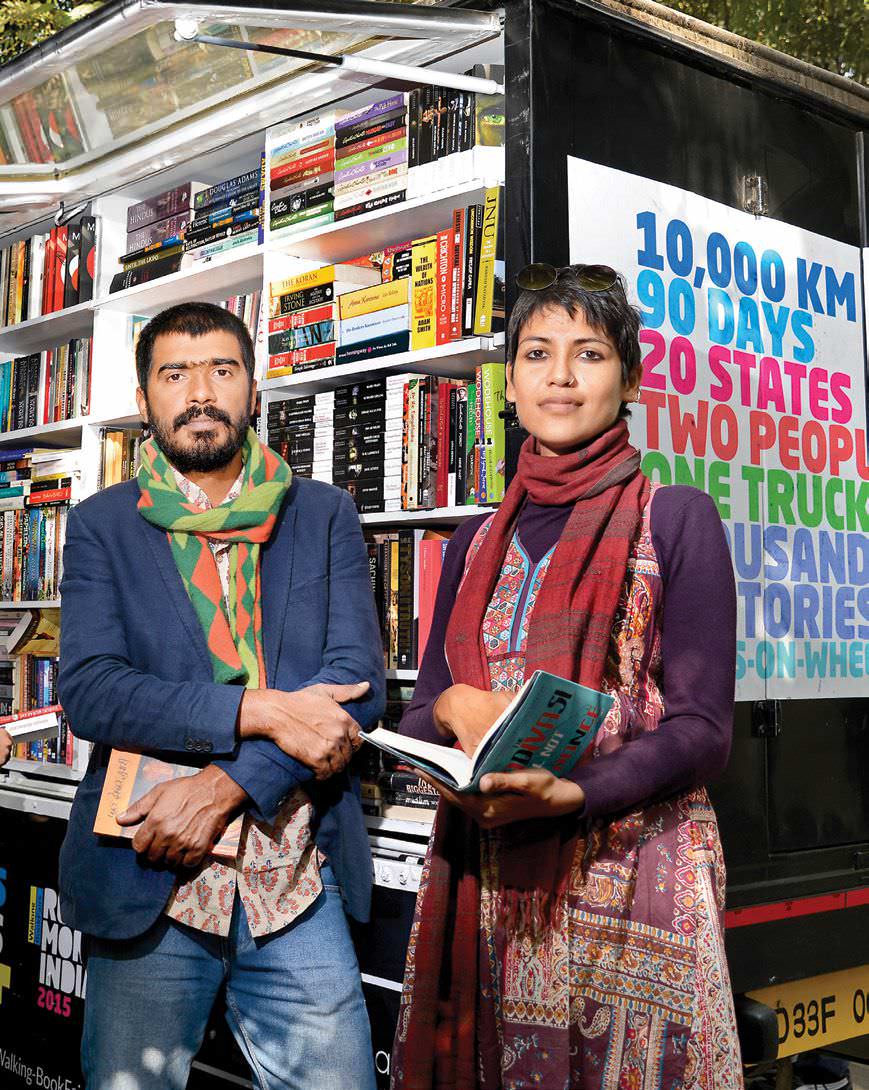Books can change the world. This is the premise with which Walking BookFairs started its journey.

Satabdi Mishra and Akshaya Rautaray became friends over books and ideas. And, like every true bibliophile, they wanted to share their love of books with the world. So they converted a mini-van into a travelling bookshop and started a journey that is now Walking BookFairs.
Though they have a store back home in Bhubaneswar, from where they sell books, Mishra, 34, and Rautaray, 36, are happiest taking their books to corners of India where few have. Starting 15 December last year, they travelled 10,000 kilometres, across 20 states, over 90 days with a book truck to spread the message of reading.
The seeds of the idea were sown when Mishra and Rautaray started talking about rights and responsibilities, and how they could contribute towards creating “a world without boundaries”. Books and reading, they were convinced, would play a crucial role. However, they realized the challenge lay in providing access to those who have none. “We can’t just talk, we must do something, we thought. And that is how we started Walking BookFairs in 2014,” says Mishra. Rautaray quit his job at a bookstore, while Mishra was taking a break after her baby at the time.
Having perceived the difficulty of the common man stepping into a bookshop, they decided they would break those barriers by “taking books to them”. With no resources to start a bookshop, they filled their backpacks with books and reached Koraput, in rural Odisha, one day. Wandering through the village roads, they displayed (Oriya and English) books at bus stops, footpaths and other public spaces. They stopped and handed out books wherever they spotted a crowd. Ordinary village folk eventually started picking them up, casting aside their inhibitions. Every time curious children gathered around them, they sat down and read to them. “We had the best time reading stories to a bunch of children,” says Mishra.
Denne historien er fra December 2016-utgaven av Reader's Digest India.
Start din 7-dagers gratis prøveperiode på Magzter GOLD for å få tilgang til tusenvis av utvalgte premiumhistorier og 9000+ magasiner og aviser.
Allerede abonnent ? Logg på
Denne historien er fra December 2016-utgaven av Reader's Digest India.
Start din 7-dagers gratis prøveperiode på Magzter GOLD for å få tilgang til tusenvis av utvalgte premiumhistorier og 9000+ magasiner og aviser.
Allerede abonnent? Logg på

ME & MY SHELF
Siddharth Kapila is a lawyer turned writer whose writing has focussed on issues surrounding Hinduism. His debut book, Tripping Down the Ganga: A Son's Exploration of Faith (Speaking Tiger) traces his seven-year-long journey along India's holiest river and his explorations into the nature of faith among believers and skeptics alike.

EMBEDDED FROM NPR
For all its flaws and shortcomings, some of which have come under the spotlight in recent years, NPR makes some of the best hardcore journalistic podcasts ever.

ANURAG MINUS VERMA PODCAST
Interview podcasts live and die not just on the strengths of the interviewer but also the range of participating guests.

WE'RE NOT KIDDING WITH MEHDI & FRIENDS
Since his exit from MSNBC, star anchor and journalist Mehdi Hasan has gone on to found Zeteo, an all-new media startup focussing on both news and analysis.

Ananda: An Exploration of Cannabis in India by Karan Madhok (Aleph)
Karan Madhok's Ananda is a lively, three-dimensional exploration of India's past and present relationship with cannabis.

I'll Have it Here: Poems by Jeet Thayil, (Fourth Estate)
For over three decades now, Jeet Thayil has been one of India's pre-eminent Englishlanguage poets.

Orbital by Samantha Harvey (Penguin Random House India)
Samantha Harvey became the latest winner of the Booker Prize last month for Orbital, a short, sharp shock of a novel about a group of astronauts aboard the International Space Station for a long-term mission.

She Defied All the Odds
When doctors told the McCoombes that spina bifida would severely limit their daughter's life, they refused to listen. So did the little girl

DO YOU DARE?
Two Danish businesswomen want us to start eating insects. It's good for the environment, but can consumers get over the yuck factor?

Searching for Santa Claus
Santa lives at the North Pole, right? Don't say that to the people of Rovaniemi in northern Finland